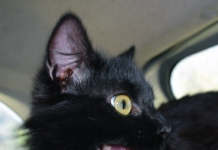A recent study led by Santiago Peralta, Cornell University School of Veterinary Medicine Assistant Professor, Section of Dentistry and Oral Surgery, found that feline chronic gingivostomatitis (FCGS)is more prevalent in shared households and its risk correlates with the number of cohabiting cats. Gingivostomatitis is marked by severe, chronic inflammation of a cat’s gums and oral mucosa. It’s most common in cats with certain viral diseases, like feline immunodeficiency virus (FIV).
The researchers studied cats diagnosed with FCGS by looking at medical records and phone interviews with the owners. They then compared the data to cats diagnosed with periodontal disease but not FCGS. Of the 76 cats in the study, 36 (47 percent) had FCGS and 40 (53 percent) were controls.
The study concluded that cats with FCGS were more likely to live in shared households and the risk of FCGS correlates with the number of cohabiting cats, supporting the belief that FCGS may be infectious.
Learn more about FCGS at https://tinyurl.com/FCGS-Cornell




